Every Sunday, Carol Giacomo ’70 stepped inside the phone booth at the end of the hallway in College Hall and dialed her parents’ house in Greenwich, Connecticut. Conversation in the late 1960s inevitably turned to the United States’ role in the Vietnam War. Giacomo was vehemently opposed and her dad, a World War II veteran who supported the U.S. presence, spoke in favor. The two engaged in fiery, often contentious debates until Giacomo slammed the phone down in frustration.
“He’d call me back,” recalls Giacomo with a laugh, “and we’d argue some more.”
The oldest child in an Italian-Irish family and the first generation to attend college, Giacomo says her independent spirit was encouraged at home—though she met initial resistance when her father learned she intended to become a journalist. “He suggested I lean toward teaching or nursing, jobs I could more easily integrate with motherhood,” she says. “I loved and respected him, so I thought about it for a minute—and then said, ‘Nah.’”
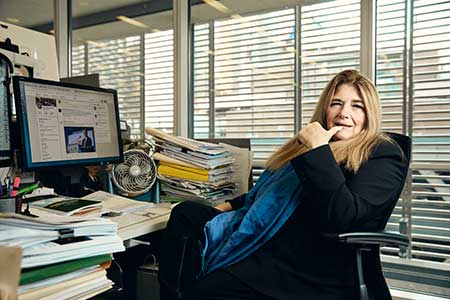 Giacomo at her desk in The New York Times office in Manhattan
Giacomo at her desk in The New York Times office in Manhattan
For Giacomo, there was no other choice. She made up her mind at the tender age of 12. “I loved to write and was passionate about politics and democracy. Journalism seemed to be a way to put everything together.” During high school, she edited the yearbook, was an editor for the newspaper, and spent a summer in The Daily Item (Port Chester, NY) obituary department.
At Regis, Giacomo joined the Regis Herald, where she found an outlet for her burgeoning views. The Vietnam War and the protest rallies she attended on campus and in Boston headlined her stories. In one edition, Giacomo turned the paper’s inside spread into a brick wall, splashed with provocative anti-war graffiti. “I thought it was brilliant and sent it off to the printer in South Boston. The printer called [then-president] Sister Jeanne D’Arc O’Hare ’39, CSJ, who summoned me to her office,” recalls Giacomo. Expecting to be chastised or even expelled by Regis’ president, Giacomo was surprised when the two had a thoughtful discussion.
Freedom of the press
Giacomo became the editor of the Regis Herald her junior year and made another bold journalistic move: “I disinvited the nun who was our adviser, citing freedom of the press.”
If we don’t have a free press, if we’re not able to search for truth and report it when we find it, then we fail as a democracy and as a country.
Carol Giacomo ’70
Freedom of the press continues to weigh heavily on Giacomo’s mind. “One of the wonderful things about our country is that we encourage open debate,” she says. “That was so important to the founders that they assigned that right in our founding documents. If we don’t have a free press, if we’re not able to search for truth and report it when we find it, then we fail as a democracy and as a country.”
Giacomo says her convictions took shape at Regis where they were nourished by freethinking professors. She lauds Joyce Marieb, PhD, for welcoming independent thought in religion class and calls former Regis president Sister Thérèse Higgins ’47, CSJ, “an intellectual force.” She recalls her first-year history teacher James Herbert as “offbeat and refreshing.” Along with a few other Regis students and a Regis professor, she stayed at Herbert’s house when they marched on November 15, 1969, in Washington, D.C., in the largest anti-war protest in U.S. history.
Lowell to Hartford to Washington
With graduation looming, Giacomo applied for reporter positions at Massachusetts newspapers, sending along Regis Herald writing samples. She landed a job at the Lowell Sun.
“I made $85 a week,” she says of the position that had her covering police, fire, and schools in Dracut. She met fellow Sun reporter Frank Phillips, now State House bureau chief for The Boston Globe. “He was very important to my early career,” says Giacomo. “I learned a lot from him.”
Democracy requires a fully engaged electorate. We need a vibrant press to keep people educated and informed and to hold public officials accountable.
Carol Giacomo ’70
Giacomo saved $500, quit her job, and set off with a friend for a year in Germany—her first extended international travel experience. When money ran out, she worked at the American army base in Munich as a personnel clerk. She eventually returned home to Connecticut and got a position at the Hartford Courant. She covered West Hartford and then moved to a city beat, writing about issues affecting neighborhoods and City Hall. “I was there when Ella Grasso was elected the first female governor of Connecticut.”
The Los Angeles Times bought the Hartford Courant and Giacomo threw her hat in the ring when a position opened at its new bureau in Washington. “I loved politics at every level. It was a huge opportunity.”
Soon after, she moved to Washington-based international news organization Reuters, where she covered Congress, specializing in foreign and defense policy. In 1986, Giacomo had her first overseas assignment writing about Cory Aquino’s defeat of President Ferdinand Marcos in the Philippine election.
One million miles, 100 countries
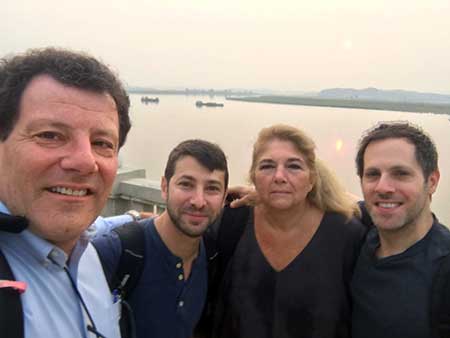 Carol Giacomo ’70 with The New York Times colleagues standing outside the foreign ministry guest house on the outskirts of Pyongyang, North Korea. Left to right: columnist Nick Kristof, videographer Jonah Kessel, Giacomo, and video editor Adam Ellick.
Carol Giacomo ’70 with The New York Times colleagues standing outside the foreign ministry guest house on the outskirts of Pyongyang, North Korea. Left to right: columnist Nick Kristof, videographer Jonah Kessel, Giacomo, and video editor Adam Ellick.
Photo courtesy of Nick Kristof
One of only a few female journalists at the U.S. Capitol at that time, Giacomo says, “I did what girls do. I worked harder. I had to be better, more present, more cooperative. I focused on doing a good job and not making a mistake.”
She was assigned to the U.S. State Department and began traveling extensively with the resident press corps. Over two decades, Giacomo logged a million miles and visited more than 100 countries with eight secretaries of state. “The secretary of state is at the center of every big international story. Things are different now, but back then journalists went everywhere the secretary went. We talked with him on the airplane, traveled in the motorcade, and stayed at the same hotel.”
Life was ever-changing. “On any given day, there could be an assassination or a plane shot down,” says Giacomo. Her bags were always packed. “I had to be a quick study and turn on a dime.”
During the Reagan administration, Secretary of State George Schultz was involved in arms control negotiations with the Soviet Union. It became a specialty area for Giacomo. “Arms control is an arcane subject. I raised my game to compete in that environment,” she says, referencing interviews with think tanks and the Arms Control Association. “I received a crash course on submarine launched ballistic missiles.”
The collapse of communism in 1991 found Giacomo in the former Soviet Union with Secretary of State James Baker. She recalls a positive step in U.S./Russian relations during a visit to a nuclear laboratory there. The State Department team came face-to-face with scientists charged with developing weapons to target the United States.
“It was a poignant meeting,” she says. “The scientists were nervous about losing their jobs. They talked about their scientific expertise and Baker suggested potential cooperative projects. Now, with Putin in power, relations are in terrible shape. But years ago, it was a moment of real promise.”
Motherhood joys and challenges
In 1986, Giacomo married a political photojournalist and later had a son, Christopher Marquette, now a journalist with CQ Roll Call. It’s a source of pride and wonder that he followed in his mother’s footsteps.
“It wasn’t easy having parents like us,” Giacomo says. “We worked crazy schedules and were constantly on the road, sometimes simultaneously in different parts of the world.”
Their full-time nanny blended well with the busy family. “She was from Chile and spoke little English but was devoted to our son and we made it work,” Giacomo says. “She was with us for 20 years and is still part of our family.”
Giacomo made the best of her days off. A yearlong fellowship in 1999 researching U.S. economic and foreign policy decision-making during the Asian financial crisis at the U.S. Institute of Peace kept her home in Washington. “Chris was playing little league baseball that summer. I drove his team to games all over Maryland and Virginia.”
I was the only wire service reporter on the trip. I made my way down the stairs, through smoke to the lobby. I called my Washington bureau and dictated the story and called home to reassure my family I was okay.
Carol Giacomo ’70, on her experience during a missile shooting in Baghdad, Iraq.
With motherhood came safety concerns while Giacomo traveled abroad. In 2003, Paul Wolfowitz, the U.S. deputy defense secretary, called journalists to task for not providing positive coverage of the Bush administration’s coalition in Iraq. Giacomo volunteered to accompany him to the country and report what she saw.
On October 26, 2003, she was at the Al Rashid Hotel in Baghdad preparing for a 6:00 a.m. meeting with Wolfowitz when a succession of noises echoed outside, followed by a huge explosion. Giacomo ran toward a window only to be pulled to the floor by her female roommate, an army sergeant. Iraqi resistance fighters had fired a barrage of missiles at the hotel, killing a U.S. army colonel on the floor below and injuring 18.
“I was the only wire service reporter on the trip,” Giacomo recalls. “I made my way down the stairs, through smoke to the lobby. I called my Washington bureau and dictated the story and called home to reassure my family I was okay.”
A Voice for the Times
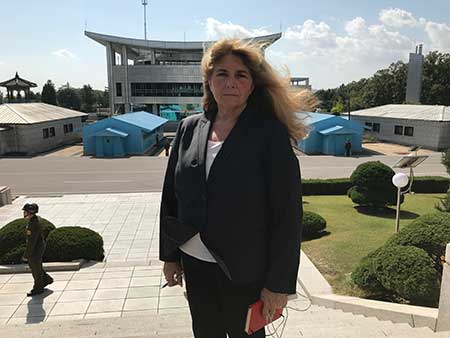 Carol Giacomo ’70 on the North Korean side of the Korean Demilitarized Zone (DMZ) in September 2017. In the background is a North Korean soldier; the large silver building is the center where the South Koreans host visitors who come to the DMZ from the South; the low slung blue buildings are where the North-South and U.S. officials/military meet for discussions.
Carol Giacomo ’70 on the North Korean side of the Korean Demilitarized Zone (DMZ) in September 2017. In the background is a North Korean soldier; the large silver building is the center where the South Koreans host visitors who come to the DMZ from the South; the low slung blue buildings are where the North-South and U.S. officials/military meet for discussions.
In 2007, Giacomo left Reuters to become an editorial board member for The New York Times. She once again took up residence in her hometown of Greenwich, where her childhood friends and siblings still live. Her writing for the editorial board involves regular independent reporting and overseas travel throughout Europe, the Middle East, and Asia.
“My job is to write the opinion of the paper in unsigned editorials; I also write opinion pieces under my own name,” says Giacomo, who won the Georgetown University Weintal Prize for diplomatic reporting in 2009. In 2018, she won the Arthur Ross Media Award for foreign affairs commentary from The American Academy of Diplomacy, an organization of former U.S. diplomats. “I loved being a reporter on the front line, but my role at the Times is perfect for me now in my career. I have a lot of experience and bring more to the table when I can speak my mind.”
A 10-day trip in Iran fueled her 2013 article, “What Iranians Say Now About ‘the Great Satan,’” highlighting Iranian sentiment—positive and negative—toward Americans. A 2013 story delved into the slow start of women’s suffrage in Saudi Arabia.
In 2017, Giacomo joined The New York Times columnist Nicholas Kristof on a five-day trip inside North Korea. The Times group was guarded by “handlers” intent on controlling every aspect of the visit, including interpreting. “Our American film crew recorded all interactions,” says Giacomo. “When we returned to New York, we hired an interpreter to listen to the tape and make corrections. Many questions and answers had been skewed for the benefit of the North Korean government.”
Truth and the future of journalism
“The truth takes rigor. The truth is worth it.” Giacomo stands by this The New York Times tagline.
“My newspaper has set a high standard for a long time,” she says of The Times, which was founded in 1851 and has won 125 Pulitzer Prizes. “The idea that people in this country, and particularly some of its leaders, dismiss and delegitimize our work as fake news is reprehensive and deeply unsettling.”
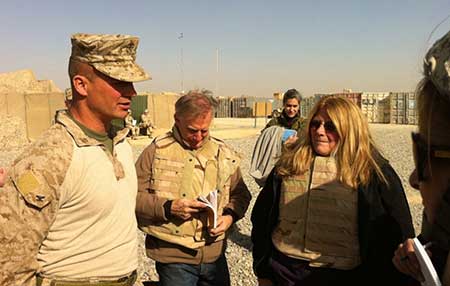 Carol Giacomo ’70 talks with a U.S. commander during a trip to visit U.S. troops in the field in Afghanistan in 2010.
Carol Giacomo ’70 talks with a U.S. commander during a trip to visit U.S. troops in the field in Afghanistan in 2010.
She talks about the lengths Times journalists go to pursue the truth. “When we write a story with the dateline Pyongyang, it means we’re actually in that city,” she says. “We’re vigilant about making corrections when mistakes are made. Truth is a big idea and hard to find. Reporters write the best version of the truth they can find that day.”
Social media has changed the public’s perception of truth. In 2011, Giacomo began actively using Twitter to keep abreast of uprisings during the Arab Spring, allowing her to get immediate updates from people on the ground.
“Social media also has a nefarious downside,” she says, referring to the manipulation of public opinion during the 2016 election. “We have to be vigilant.”
Giacomo worries about the future of journalism as media outlets disband and reporters are threatened and killed in record numbers. “Democracy requires a fully engaged electorate,” she says. “We need a vibrant press to keep people educated and informed and to hold public officials accountable.”
Media literacy, Giacomo believes, should be taught early in schools so students learn how to verify sources and distinguish fact from fiction. For her part, Giacomo serves as a visiting professor of journalism at Princeton University. She is a frequent speaker at colleges, think tanks, and on media shows. She brings an expert’s perspective to The New York Times-sponsored tours overseas.
Though Giacomo travels the world as an international journalist, she recognizes the value of news close to home. She harks back to her early days as a cub reporter when community newspapers were the lifeblood of small towns.
“Journalism is more important today than ever before,” says Giacomo. “If money were no object, I’d find five places in the United States desperately underserved and open newspapers there.”
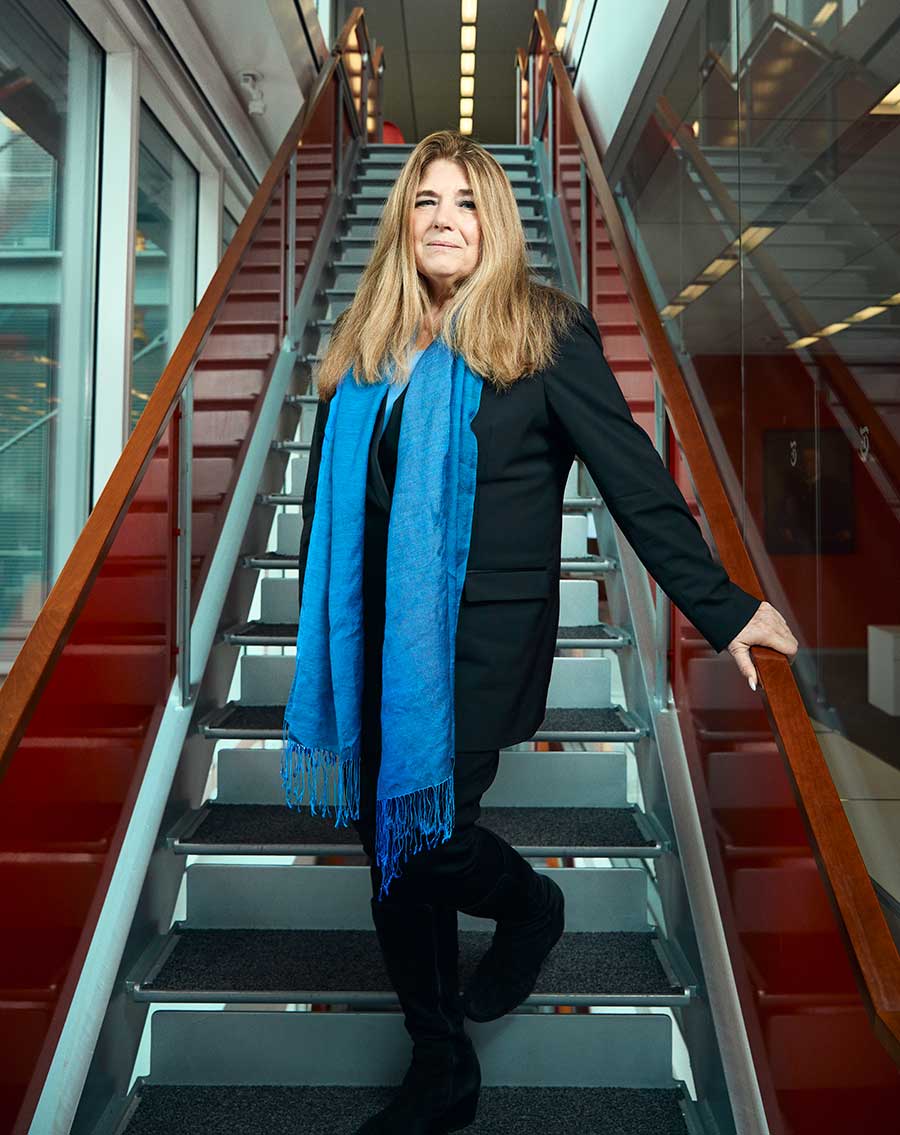
Read more articles
Read the entire magazine online